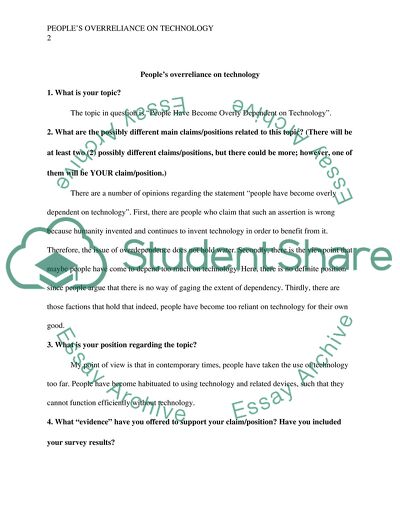
- Home
- Free Samples
- Premium Essays
- Editing Services
- Extra Tools
- Essay Writing Help
- About Us
- Studentshare
- Subjects
- Miscellaneous
- People Have Become Overly Dependent on Technology
People Have Become Overly Dependent on Technology - Essay Example
There are a number of opinions regarding the…

- Subject: Miscellaneous
- Type: Essay
- Level: Ph.D.
- Pages: 4 (1000 words)
- Downloads: 0
- Author: blazegreenfelde
Extract of sample "People Have Become Overly Dependent on Technology"
Here, there is no definite position since people argue that there is no way of gaging the extent of dependency. Thirdly, there are those factions that hold that indeed, people have become too reliant on technology for their own good. My point of view is that in contemporary times, people have taken the use of technology too far. People have become habituated to using technology and related devices, such that they cannot function efficiently without technology. Most people nowadays cannot think for themselves; a technological device has to be in place to supplement the thinking process.
Murray (2000) gives the example of the use of Google to get solutions concerning a particular subject. For most people, today, the answer to a research question is just a click away because people will just Google the answer. To some extent this has led to the underutilization of people’s mental faculties. In addition, resources such as encyclopedias and atlases have lost meaning in the wave of the technological revolution. The overreliance on the internet to gain knowledge is a worrying trend, especially for the youth who are still in the educational system.
The overdependence on technology has also been elucidated by the increasing isolation of people from the real social scene. The emergence of social sites such as Facebook and Twitter has led to limited physical interactions between people. People can now have acquaintances on social sites whose become “friends” even though the involved people never meet (Abelson, Ledeen, & Lewis, 2008). As a result, people have become very isolated from their “real-life friends”, with majority spending most of their free time communicating with people on social sites.
Similarly, the usage of cell phones to send messages and make calls has ensured that people are able to communicate without having to meet physically. Society has come to
...Download file to see next pages Read MoreCHECK THESE SAMPLES OF People Have Become Overly Dependent on Technology
People have become overly dependant on technology
Have people become overly dependent on technology
Have people become overly dependent on technology
Is People have become overly dependent on technology
People Have Become More Overly Dependent On Technology
Self-evaluation People Have Become Overly Dependent on Technology
Are We Too Dependent on Computers
Are we getting overly dependant on technology

- TERMS & CONDITIONS
- PRIVACY POLICY
- COOKIES POLICY